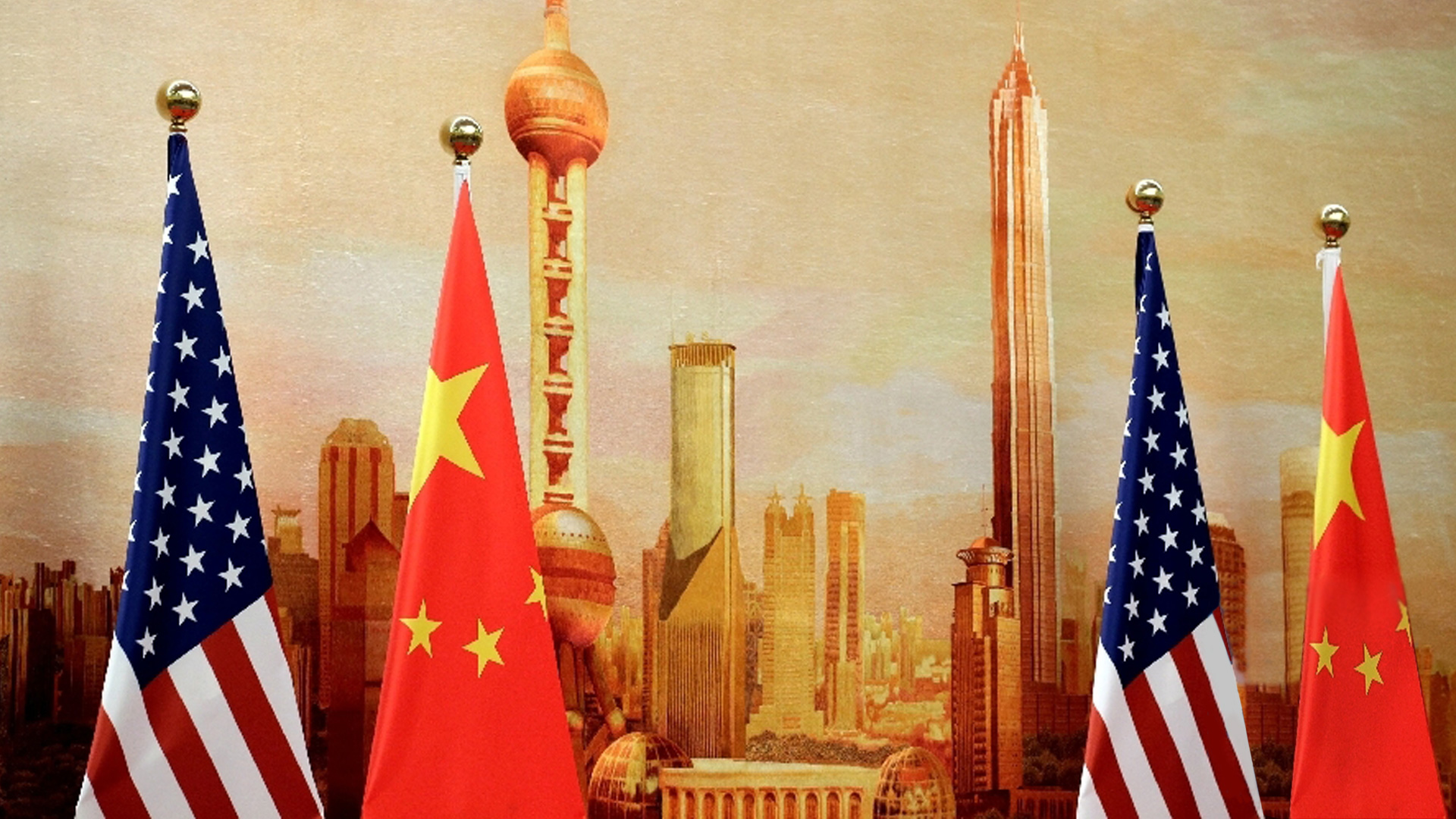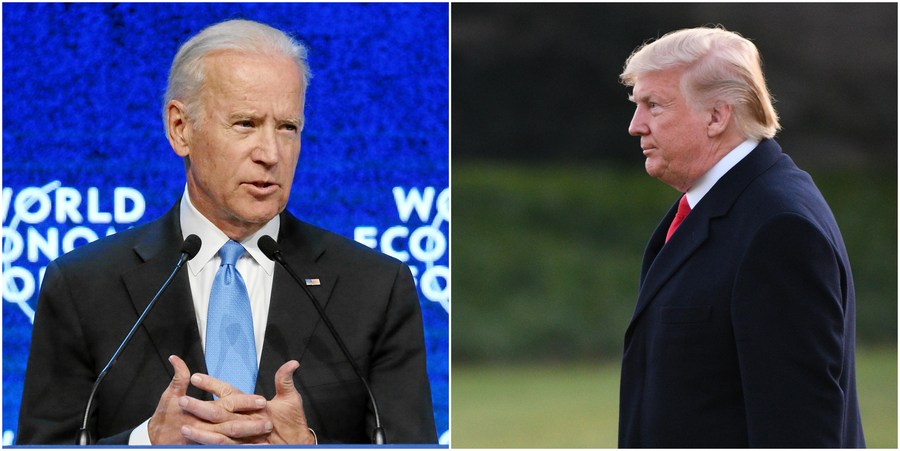
U.S. and Chinese flags are placed for a joint news conference at the Great Hall of the People in Beijing, China June 14, 2018. /Xinhua
U.S. and Chinese flags are placed for a joint news conference at the Great Hall of the People in Beijing, China June 14, 2018. /Xinhua
Editor's Note: Ken Moak taught economic theory, public policy and globalization at the university level for 33 years. He co-authored a book "China's Economic Rise and Its Global Impact" in 2015. The article reflects the author's opinions, and not necessarily the views of CGTN.
It is hard to believe that the U.S.-China relations could improve whether Donald Trump or Joe Biden wins the presidency on November 3, given that the ties are at its lowest point since the countries established diplomatic relations in 1979.
However, recent signs are pointing to just that. Trump ordering his chief negotiators – Robert Lighthigzer and Steven Mnuchin – to ensure the implementation of the phase one trade agreement because China buying more agriculture and other products could improve his re-election fortunes.
Patrick Shanahan, Trump's defense secretary, asking other countries to join with the U.S. to counter what he called "Chinese aggression," is refusing to fight a "hot war" with China. Joe Biden is hinting that he might stop the trade war against Chinese because Trump's tariffs are "killing" the American economy.
Trump has reasons to reset the China-U.S. relationship. His ill-advised China trade policy, in part, was responsible for the downward movement of the U.S. economy, reducing economic growth from 2.9 percent in 2018 to 2.3 percent in 2019. This is because the excise taxes were paid by U.S. importers, which were passed on to businesses and consumers in the form of higher prices.
Chinese tit-for-tat tariffs pushed many farmers to the brink of financial disaster, requiring billions of dollars in taxpayers' bailout money. The result was the economy lost over 40 billion U.S. dollars, eroded manufacturing and increased the impoverished population, according to the U.S. Federal Reserve.
Being the world's two largest economies and trading nations, the China-U.S. trade feud adversely impacted the world. Thanks to the U.S.-inspired global supply chain and the importance of trade on the global economy, disruptions in U.S.-China trade reduce buying of global resources and manufacturing activities in the involved countries.
Trump (and probably Biden as well) are well aware that if the trade issues are not addressed, the U.S. economy could be pushed into a deep depression, perhaps just as bad as or worse than the 1930s Great Depression. The flailing U.S. economy, which contracted by almost 33 percent in the second quarter and expected to sink by over eight percent in 2020, is largely attributed to the trade war and Trump's mishandling of the COVID-19 pandemic.

Former U.S. Vice President Joe Biden (L) and President Donald Trump. /Xinhua
Former U.S. Vice President Joe Biden (L) and President Donald Trump. /Xinhua
Ironically, "butting heads" with China harmed the U.S. economy more than China's in that the Chinese economy registered a growth rate of 3.2 percent in the same period largely because of its early containment of the pandemic, expansionary fiscal policies for economic recovery and expanding trade and investment with the Belt and Road Initiative participating countries.
Similar disappointing results for the U.S. are found in Trump's technology conflicts against China. Instead of crippling Huawei, the Chinese company recorded over 13 percent increase in revenue in 2019 year on year.
On reviving the over-a-decade-old Quadrilateral Strategic Dialogue into the "Indo-Pacific" strategy to counter China's rise, the Trump administration not only failed to establish a formal alliance among the U.S., Japan, Australia and India, but also unable to enlist other Asian coutries to join it against China.
It is against this backdrop that Trump would reset the China-U.S. relationship, not necessarily to full cooperation, but at least not letting it fall to the level that could cause unnecessary mutual destruction.
Joe Biden has ample experience in dealing with Chinese leaders, thus understanding the difference between cooperation and confrontation. He said himself a year ago that China is not a threat to U.S. interests or security. And in his acceptance speech, Biden hinted that he will seek cooperation with China in areas where the two countries' interests converge.
Furthermore, both presidential candidates recognize China must be in the conversation on issues such as climate change, global peace and security, trade and financial systems reform. The U.S. can find no better partner than China to curb greenhouse gas emission because the latter has allocated more resources to green energy development and production than any country on earth.
Being permanent members of the United Nations Security Council, China and America, along with the UK, France and Russia are the "guardians" of world peace and stability. Being the world's largest trading nations and financial stakeholders, China and U.S. cooperation is the only way to develop meaningful trade and financial reforms.
That said, there will be groups in both camps trying to derail a U.S.-China relationship for a host of reasons: those in the pockets of vested interests; harboring future presidential ambitions; or simply distrusting communism. But Trump or Biden should not have any problem in curbing these groups' ambitions.
According to the latest Gallup Poll, around 60 percent of Americans disapprove of Trump's anti-China policies, albeit having a negative view on China perhaps because of fear mongering fanned by Trump and the media.
The majority of Americans questioned the wisdom of treating China as the enemy since they have brought nothing but economic despair and risk of national security. In this sense, most Americans want their president to improve relations with China. Trump and Biden will likely oblige.
(If you want to contribute and have specific expertise, please contact us at opinions@cgtn.com.)